David Fithian is ready for change
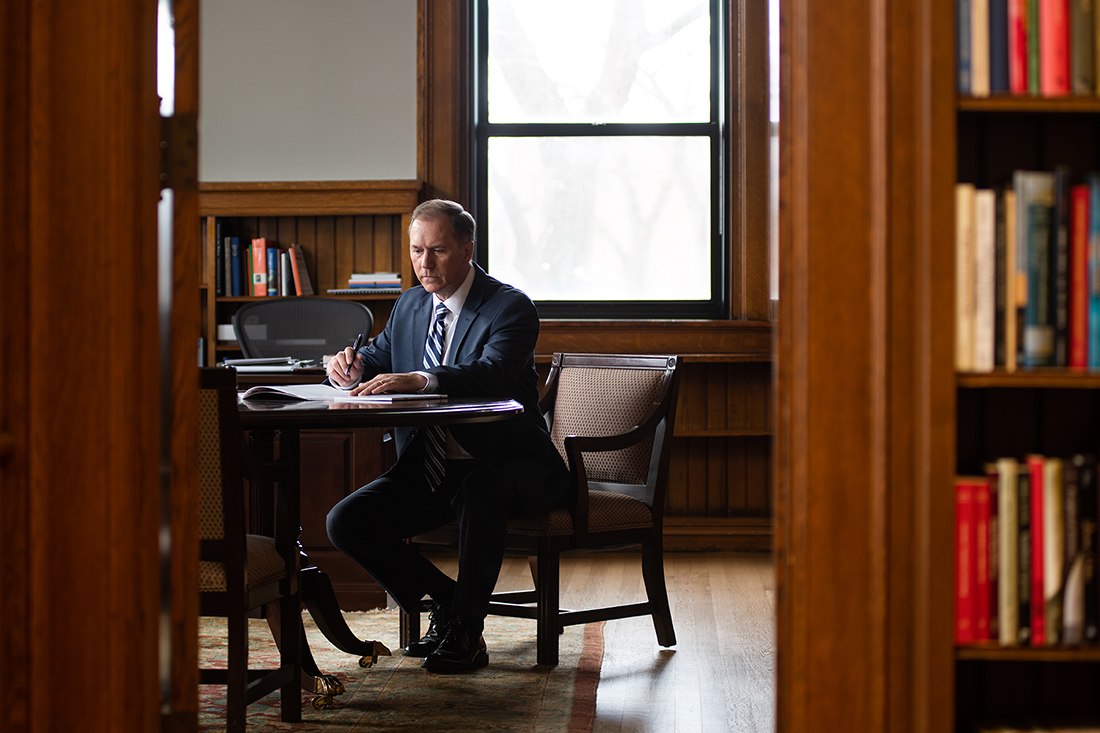
David Fithian is no stranger to challenging beginnings.
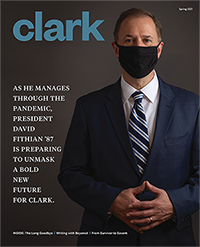
In his first six weeks on the job as assistant dean of freshmen at Harvard University, he encountered a flurry of serious incidents involving students that required his urgent intervention. His first year in administration at the University of Chicago paralleled the transition of a new president who was building and empowering a new leadership team.
And last July, when Fithian took office as Clark University president, he did so amidst a fast-moving global pandemic that shook up nearly every academic and operational norm.
In a series of early decisions he made as president, Fithian had to consider whether and how to reopen the campus for the fall semester. This was not a simple “yes or no” proposition. It required an extraordinary financial commitment to improve infrastructure, create a testing facility, and invest in online learning technologies. It also meant implementing strict protocols that dramatically curtailed students’ social interactions, canceling the fall and winter sports seasons, and making countless other adjustments and concessions to preserve health and safety.
But Fithian’s history of early on-the-job challenges had prepared him to marshal his skills, trust his instincts, and lead in a way that benefits the institution he serves.
“As each challenge comes, you build on what you’ve learned to guide your decision-making,” he says. “So while it’s absolutely true that as incoming president I did not expect to be helping manage Clark through a pandemic, you play the cards you’re dealt rather than bemoan the circumstances.
“I know someday,” he adds with a smile, “I’ll look back and say that while this first year at Clark was tough, we’ve done some wonderful things.”
•••••
David Fithian, proud member of the Class of 1987, succeeded David Angel to become the 10th president in Clark’s 134-year history — the first alumnus to hold the position and certainly the first president to have been introduced to the University through a brochure.
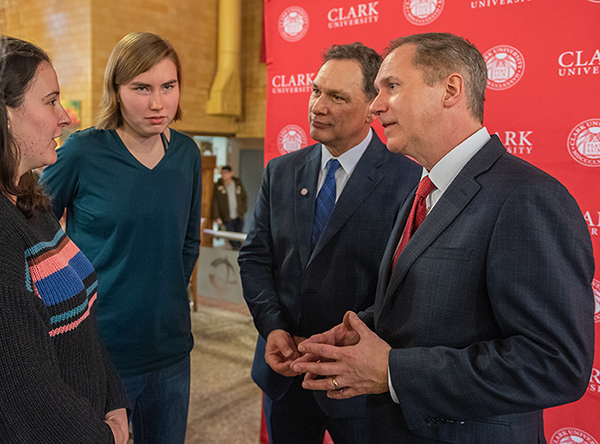
He received one in the mail during his senior year at Westlake High School in Thornwood, New York, as he was mulling where to continue his education. The brochure’s paper was high quality, the design was striking, and the promise that Clark was both rigorous and welcoming resonated more deeply with him than the come-ons from other colleges. Clark had decisively won the battle of first impressions.
Fithian arrived on campus in 1983 intent on majoring in psychology and furthering his passion for graphic arts, art, and architecture (he eventually would major in sociology with an additional concentration in English). He discovered the brochure had been truthful and found a place that was inviting and open, but also one that challenged its students to be active participants in their own education and learn how to make the most of the opportunities presented to them. Clark students were not channeled into prescribed pathways nor were they “categorized” — in the words of the University’s popular poster of the time depicting multicolored peas in a pod. They worked hard; they inquired and experimented. They figured things out.
“There are lots of places where you show up and you let your education ‘happen’ to you,” he says. “I appreciated that Clark was not like that. It was practically a requirement for you to answer the question, ‘What do I want to get out of my Clark experience?’ To me, that made Clark distinct and special, and still does.”
After graduating in 1987, Fithian earned his M.A., M.Phil., and Ph.D. degrees in sociology from Yale, where his dissertation, “A Dark and Shining Stone: Symbol Contests and the Vietnam Veterans Memorial,” received the Theron Rockwell Field Prize, the first time a social science dissertation earned this distinguished literary award. And it was at Yale where he met Michael Rodriguez, a graduate student in clinical psychology who would become his husband and life partner (read about Rodriguez here).
He worked in a number of research and academic positions — including lecturer at Yale and at the University of Connecticut (Stamford) — before joining Harvard in 1995, where for 12 years he held positions of increasingly elevated responsibility. As the Allston Burr Senior Tutor (Resident Dean) in Adams House he was responsible for the academic standing and personal well-being of 425 upperclass students. In his last position at Harvard, as associate dean of the Faculty of Arts and Sciences, Fithian oversaw all aspects of legislative affairs of the faculty.
Louis Menand, a professor of English at Harvard, recalls Fithian’s deftness while acting as liaison between faculty and administration on the sensitive matter of introducing a new general education curriculum to the college. “He helped us negotiate the minefield. I trusted him completely and relied on his advice often in devising the new curriculum and in selling it. He was a rock.
“In a sense, David’s experience and skills amounted to a trifecta: students, faculty, and administrators,” Menand says. “He understood them all and balanced their needs. If you throw in trustees, donors, and alums, that pretty much describes the role of a university president.”
In 2007, Fithian joined the University of Chicago as secretary of the university. By 2014 he had risen to the position of executive vice president, where he oversaw strategic planning for President Robert Zimmer, an especially close mentor, and led university efforts in an array of key areas including campus master planning, capital projects, the arts, governance, international centers, and the negotiation and stewardship of a number of major gifts to the university.
Katie Callow-Wright, executive vice president and chief of staff in the Office of the President at Chicago, who succeeded Fithian, says Fithian’s most elegant skill may be his ability to recognize and cultivate talent, which allows him to build strong leadership teams.
“David is a creative and open thinker who doesn’t shy away from a good argument, especially one that gets the best ideas onto the table and helps everyone work toward the most productive outcome,” Callow-Wright says. “He doesn’t put on airs about hierarchy, and he works across university boundaries in a way that’s truly exceptional. His brave authenticity is a hallmark of who David is as a person.”
•••••
On December 15, 2020, just before the winter break, David Fithian delivered his first State of the University Address to the Clark community via livestream. In it, he noted Clark’s history of providing a top-quality education on limited resources by operating within a self-imposed “culture of austerity.”
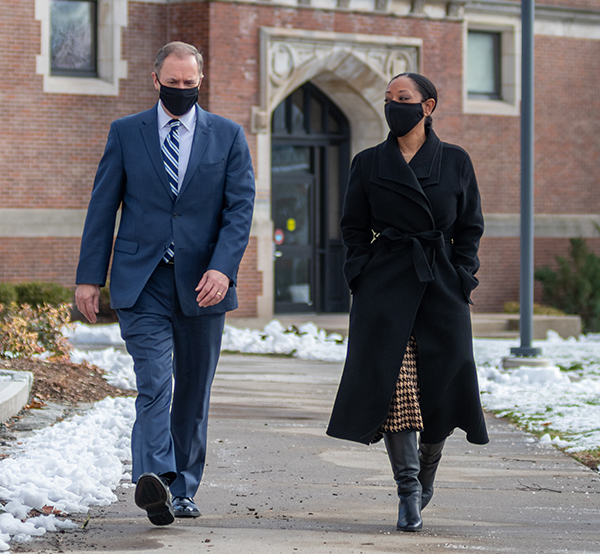
This approach, while laudable, is no longer sustainable, he insisted, and needs to evolve into a “culture of possibility” fueled by bold vision, strategic planning, and thoughtful investment in people, programs, and facilities that advance Clark’s mission and reinforce its shared values. Some discomfort and some risk will be involved, he cautioned, as Clark is compelled to adapt to a higher education landscape that may look substantially different than it did ten, or even five, years ago.
It’s a theme Fithian continues to reiterate, and one that was central to his accepting the president’s position at his alma mater.
“I am so appreciative of David Angel’s powerful and thoughtful leadership over the last ten years, and now I see an opportunity to build on the solid foundation he left me,” he says. “I took this job because I think I can make a difference for Clark. If the trustees had been looking for someone to manage the status quo, I would have been far less interested. But the board’s message to me was that Clark is ready for change.”
Ross Gillman ’81, chair of the Clark Board of Trustees, notes that Fithian’s exemplary leadership since returning to Clark “during this remarkable and unique year” has further solidified the board’s conviction that he was the best person for the job.
“When we invited David to join us as our 10th president, nobody could have foreseen the pandemic and other national conditions that he has had to deal with during the first year of his tenure,” Gillman says. “What we all could see were David’s enthusiasm for undertaking the transformative changes that our University needs. David has a deep understanding of the institution and its history, and is exceptionally strategic and consistent in how he approaches the issues facing not only Clark but higher education in general, all while still being measured and flexible in the implementation of his vision.
“Perhaps even more importantly, David has diligently and successfully been building a strong and broad consensus of the steps that need to be taken and investments that need to be made, both now and in the coming years, to secure Clark’s position as a small but elite research university that also offers our undergraduates a preeminent liberal arts education.”
Fithian has identified “areas of opportunity” that are informing the strategic framework being developed by his leadership team, with substantial input from the campus community. The five areas — academic and research programs, campus experience, culture and identity, outward engagement, and institutional capacity — are being addressed in tandem to purposefully map out Clark’s future. Read more about the strategic framework here.
Clark, he says, has reached an inflection point that requires strong and deliberate action to build upon its strengths and respond to the evolving challenges within the higher education marketplace. He points to Clark falling out of the top 100 in the U.S. News & World Report college rankings, whose influence can be debated but not ignored, particularly at a time when competition for a dwindling pool of students has never been fiercer.
“We ignore the rankings at our own peril,” Fithian says. “Higher ed is increasingly being viewed through the lens of consumerism, and students and their families are looking for value associated with their investment. There is no time to spare to address the elements within those ranking systems where we perform poorly.” He believes addressing these issues not only will improve the rankings but ultimately will strengthen Clark.
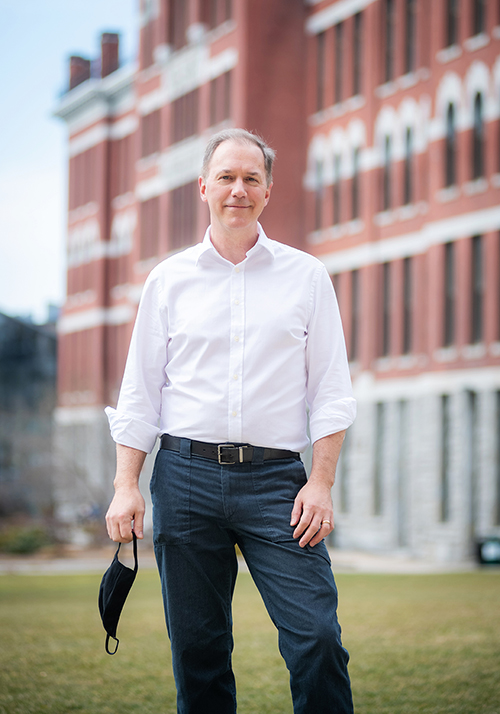
The president is encouraging key investments in all facets, from academics to facilities, that will require the University to shift its thinking out of the do-more-with-less mindset to consider bolder possibilities and to more vigorously trumpet its achievements while also preserving pride in the cherished aspects of the University’s identity. It’s a perspective that perhaps moves against the grain of the Clark character, where modesty traditionally has been the default setting.
“Clark is a world-class research university, and we need to believe that we are worth paying attention to,” he says. “If we take the time and effort to work on this together, we’ll be pleased with the payoff. If we fall victim to lack of courage and try to overprocess everything so we’re not doing this in a timely way, we won’t get to where we need to be.”
Attracting new resources to justify the risks and realize the possibilities falls on his shoulders, Fithian says. He wants to recruit “new friends” to join the University’s devoted core of alumni supporters and get them excited about what Clark already has achieved and what it is yet capable of accomplishing.
“We need our alumni to re-engage, not just financially, which is essential, but also to stay involved in the life of the University and contribute in other ways as well. But we can’t look only to our alumni — we need to expand our circle of friends and supporters.”
“I believe we can make good on the promise of our greatest ideas,” he says. “But we will not attract interest with the promise we can make these things happen — only with the demonstrated ability to do so. We must show that we’re on the move.”
•••••
A month before the president’s first day on the job, four Clark students were arrested by Worcester Police during a protest of the police killing of George Floyd in Minneapolis. In the aftermath, a number of students, most vociferously the Black Student Union, insisted that Clark’s efforts in the areas of diversity, equity, and inclusion on campus had been sluggish and indifferent for many years.
Fithian acknowledges that intensive improvement is needed to foster a more just and equitable Clark. To that end, he has committed $1 million in resources toward a series of measures that include, among other things, introducing cultural competency and anti-racism training for staff, faculty, and students; filling new staff positions responsible for better supporting and recruiting marginalized students and students of color; and actively working toward a curriculum that makes the academic experience more inclusive and engaging.
“This is a priority, not only because I believe it’s the right thing to do, but also because it is inextricably linked to who we say we are,” he says. “We are a place that believes we challenge convention in order to change the world, and that must be reflected in lived values and the lived experiences of our students and community members.”
•••••
The pandemic did not bring Clark to its knees. Far from it. The president’s leadership team and many working groups coalesced campus efforts around a fall semester whose most meaningful barometer of success was the health of the University community. By the numbers, Clark administered 85,747 COVID-19 tests over the course of the semester, which yielded 44 positive results. The favorable positivity rate of 0.058 percent was significantly lower than that of many colleges and universities across the country.
Clark began the spring semester with remote-only classes in late February and in-person operations resuming on March 10.
Still, every routine, every rhythm, of a typical academic year has been disrupted. Fithian had hoped to conduct a “listening tour” of students, staff, and faculty in the first months of his presidency and instead was unable even to walk across campus unmasked. Zoom meetings and virtual town halls have proved an unsatisfying compromise.
He also regrets the lack of opportunity to forge in-person connections with alumni. “Our alumni haven’t gotten a chance to know me, and vice versa,” he says. “From those I’ve spoken with, I’ve heard tremendous stories about the transformative experiences they had here and their sense of excitement for what’s to come. As a fellow alum, that’s gratifying to hear.”
Fithian is eager to move beyond campus to continue deepening Clark’s ties with the Main South community, an integral partnership that advances and empowers both the University and the neighborhood. “Our responsibility and commitment to Main South are paramount to who we are as an institution that wants to serve this city, and as a good neighbor to the people who live around us and among us,” he says.
Last September, with students newly returned to campus and the pandemic on the march, Fithian attended a production of “Little Women,” staged by Clark Musical Theatre on the lawn outside the Little Center. It was a sunny Saturday afternoon, and he and his fellow audience members sat, socially distanced, on blankets and lawn chairs to enjoy the students’ adaptation of Louisa May Alcott’s story about the March sisters grappling with issues of individual identity, personal integrity, and the desire to embrace new and exciting possibilities.
“What resonated with me that day, besides the fact that we have some very talented actors and actresses at Clark, was the power of our community,” he recalls. “At that moment it didn’t matter that the event had been forced to be held outdoors, or that we wore masks. We weren’t going to be denied the opportunity to celebrate this incredible performance by our students.”
In this year of the virus, when the challenges have gone from constant to cascading, the performance of “Little Women” under the September sun was an early glimmer that from yet another demanding beginning in the career of David Fithian, some wonderful things would emerge.
Related stories:


